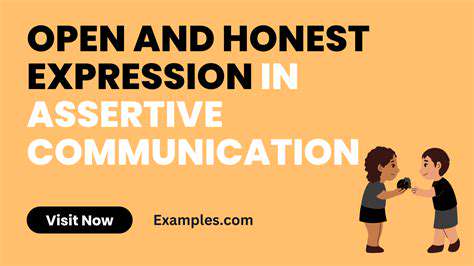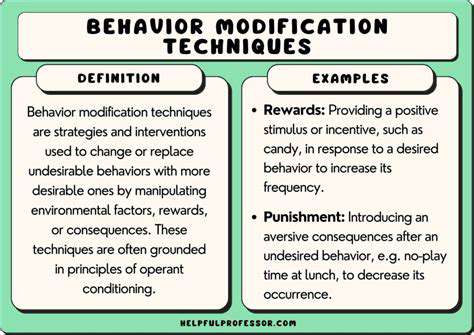Guide to Setting Healthy Boundaries in Relationships

Establishing Clear Limits
Defining personal boundaries is a crucial step in managing your time and energy effectively. It involves recognizing what you're willing and not willing to do, and communicating those limits clearly to others. This proactive approach fosters healthier relationships and prevents burnout. Understanding your limits is the first step in prioritizing your well-being.
Setting clear boundaries also involves acknowledging your emotional and physical needs. It's about recognizing when you're reaching your capacity and needing to step back. This self-awareness is vital for preventing overwhelm and maintaining a sense of equilibrium.
Communicating Your Boundaries Effectively
Effectively communicating your boundaries is a cornerstone of healthy relationships. It's not just about saying no; it's about expressing your needs and expectations in a respectful and assertive manner. Open and honest communication helps prevent misunderstandings and fosters mutual respect. Clearly articulating your limits sets a healthy precedent for others in the relationship.
Practice active listening and ensure the other person feels heard as you explain your boundaries. This demonstrates respect and promotes a more productive dialogue.
Recognizing and Responding to Boundary Violations
Boundary violations can manifest in various forms, from subtle infringements to outright disregard. Understanding how to identify these violations is critical for protecting your well-being. Knowing how to recognize these violations is empowering, enabling you to respond appropriately. Early identification allows you to address the issue promptly and avoid escalating tensions.
Responding to boundary violations requires a calm and assertive approach. This means communicating your discomfort and expectations without resorting to aggression or passive-aggression.
Prioritizing Self-Care within Boundaries
Self-care is intrinsically linked to establishing and maintaining boundaries. It involves recognizing and meeting your physical, emotional, and mental needs. By prioritizing self-care, you build a stronger foundation for managing your boundaries. This allows you to approach interactions with others with a greater sense of clarity and composure.
Engaging in activities that promote relaxation, rejuvenation, and emotional well-being reinforces the importance of setting boundaries. This is crucial in mitigating stress and ensuring sustainable well-being.
Managing Expectations and Accepting External Limitations
Understanding that you can't control everything is an essential aspect of boundary setting. This involves recognizing your own limitations and acknowledging the realities of external pressures. Setting realistic expectations prevents frustration and disappointment. This helps you focus on what's within your control and accept what's beyond your influence.
Learning to navigate situations where external factors or limitations affect your ability to maintain your boundaries is a critical skill. This involves adapting and adjusting your strategies as needed.
The Impact of Boundaries on Relationships
Healthy boundaries, when established and communicated effectively, can significantly strengthen relationships. They foster mutual respect and understanding, allowing individuals to feel valued and supported. By creating an environment where everyone's needs are considered, conflicts are often minimized. This fosters a positive and supportive space for interactions.
Overcoming Challenges in Setting Boundaries
Setting and maintaining boundaries can be challenging, especially when dealing with individuals who may not respect or understand them. Learning to overcome these obstacles is key to building resilience and fostering healthy relationships. Overcoming challenges involves practice, persistence, and a willingness to adapt your approach.
Seeking support from trusted friends, family members, or professionals can provide invaluable guidance and encouragement during this process.
Communicating Your Boundaries: Open and Honest Dialogue

Understanding Your Boundaries
Defining personal boundaries is a crucial step in effective communication. It's about recognizing what you're comfortable with and what you're not. This involves introspection and self-awareness, acknowledging your limits and understanding what actions or behaviors make you feel respected and valued. Setting healthy boundaries is not about being selfish; it's about ensuring your well-being and fostering respectful relationships. Recognizing your emotional, physical, and mental limits is a vital step in protecting your emotional health.
Understanding your boundaries also means recognizing what pushes those boundaries, and what your reactions are when they are crossed. Knowing these patterns can help you anticipate situations where you might need to communicate your boundaries. This self-assessment is fundamental to effective communication.
Communicating Your Boundaries Assertively
Once you understand your boundaries, expressing them assertively is key. This involves clearly and respectfully communicating your needs and limits to others. Assertive communication prioritizes your needs without violating the rights of others. It's about expressing your feelings and opinions in a direct but considerate manner, focusing on I statements rather than blaming others. This approach allows for open and honest dialogue, leading to mutual understanding. It's a skill that can be developed and refined over time.
Active listening is also a crucial part of assertive communication. Being able to hear and understand the other person's perspective while still expressing your own limits is critical in preventing misunderstandings and conflict. Truly effective communication involves a balance of expressing yourself and actively listening to the other party.
Practicing Active Listening and Empathy
Beyond expressing your boundaries, effective communication also involves active listening and empathy. Truly hearing what others are saying, even if you disagree, is crucial for building strong relationships. This involves acknowledging their perspective and validating their feelings without necessarily agreeing with their actions. Active listening skills include maintaining eye contact, asking clarifying questions, and summarizing what you've heard to ensure mutual understanding. This builds trust and respect between individuals.
Demonstrating empathy is also essential. Trying to understand the other person's feelings and motivations can help create a more positive and productive exchange, even when discussing difficult topics. This fosters a more understanding and supportive environment. Empathy in communication can transform difficult discussions into opportunities for growth.
Addressing Boundary Crossings Respectfully
Sometimes, your boundaries will be crossed. When this happens, it's important to address the situation respectfully and assertively. This might involve calmly and clearly explaining how the behavior made you feel and what you need to ensure future interactions respect your boundaries. Communication is vital in these scenarios, allowing both parties to understand the implications of their actions and the importance of mutual respect. Remember to avoid resorting to accusations or becoming confrontational.
It’s crucial to establish clear consequences for boundary violations to prevent future issues and uphold your personal needs. This allows for both understanding and a respectful approach for all involved.
Enforcing Your Boundaries: Consistent Action and Support
Understanding Your Boundaries
Defining your boundaries is the cornerstone of enforcing them. This involves introspection and self-awareness. What are your limits regarding time, energy, emotions, and personal space? Identifying these limits is crucial. A clear understanding of your boundaries allows you to recognize when they're being crossed and respond appropriately. This process requires honest reflection and a willingness to acknowledge your needs.
Taking the time to understand your personal values and how they relate to your boundaries is essential. What principles guide your actions? How do your values influence your comfort levels in various situations? By connecting your boundaries to your core values, you create a stronger foundation for consistent enforcement.
Communicating Your Boundaries Clearly
Once you've established your boundaries, it's essential to communicate them effectively. This involves expressing your needs and limits in a way that's respectful, direct, and assertive. Avoid being passive or aggressive. Focus on stating what you need, not what you don't want. For example, instead of saying Don't call me late at night, try I prefer to not receive calls after 10 pm. Clear and concise communication significantly improves the chances of your boundaries being respected.
Responding to Boundary Violations
Inevitably, someone will try to cross your boundaries. Knowing how to respond calmly and firmly is crucial. A well-defined approach involves understanding your triggers and developing specific responses. A crucial component of this response involves maintaining self-respect. You deserve to feel safe and respected in your interactions. Practice effective communication strategies when navigating these challenging situations.
Responding to boundary violations isn't about punishment but about protecting your well-being. It's about establishing healthy interactions and preventing future encroachments. Remaining calm and focused on clearly stating your boundaries helps ensure you are heard and understood, maintaining a respectful exchange.
Seeking Support for Boundary Enforcement
Enforcing boundaries can be challenging, and seeking support is a sign of strength, not weakness. Talking to trusted friends, family members, or a therapist can provide valuable insights and strategies for effective boundary setting. They can offer different perspectives and help you develop skills to navigate difficult situations with confidence.
Supportive relationships play a critical role in maintaining your boundaries. They can provide encouragement, understanding, and guidance during moments of uncertainty. Remember, you're not alone in this journey.
Consistency in Your Actions
Consistency is key to reinforcing your boundaries. If you inconsistently enforce your limits, others will likely try to push them further. Be prepared to repeat your boundary statements, even if they face resistance. Remaining firm and steadfast reinforces the message that your boundaries are non-negotiable.
Consistency involves actively practicing the skills you've learned to set and maintain boundaries in your daily life. Over time, this consistency strengthens the understanding of your boundaries within yourself and others. This ongoing practice prevents misunderstandings and ensures your well-being is prioritized.
Addressing Internal Barriers to Boundary Setting
Enforcing boundaries often involves confronting internal challenges. Fear of conflict, people-pleasing tendencies, or past traumas can all obstruct your ability to set and maintain boundaries effectively. Identifying these internal barriers is crucial. Seek introspection and develop strategies to overcome these challenges.
Seeking Professional Guidance if Needed
If you're struggling to enforce your boundaries, despite your best efforts, consider seeking professional guidance. A therapist or counselor can offer personalized support and strategies tailored to your specific needs. They can help you identify underlying issues and develop effective coping mechanisms to reinforce your boundaries.
Sometimes external help is necessary to address deeply rooted issues that hinder boundary setting. A professional can provide a safe space to address any personal blocks to establishing and maintaining healthy boundaries.
Maintaining Your Boundaries: Ongoing Effort and Self-Care
Understanding Your Boundaries
Defining and understanding your personal boundaries is the cornerstone of maintaining them effectively. It involves recognizing your limits, both physical and emotional, and what you're comfortable with in various situations and interactions. This self-awareness isn't a one-time thing; it's a continuous process of reflection and adjustment as you grow and experience new things. Genuine self-awareness about your needs is key to setting those boundaries in the first place.
Identifying what pushes your buttons and triggers negative reactions is crucial. Recognizing these triggers allows you to anticipate potential situations and develop strategies to manage them proactively. By understanding your own sensitivities, you equip yourself to respond with greater control and clarity, ultimately fostering healthier relationships.
Communicating Your Boundaries Clearly
Effectively communicating your boundaries is just as important as understanding them. This involves expressing your needs and limits in a straightforward and assertive manner, without resorting to aggression or being overly passive. Practice articulating your boundaries in a way that's respectful to others while also firm in maintaining your own needs. Clear communication prevents misunderstandings and sets the stage for healthy interactions.
Being open about your boundaries is not about being demanding but rather about setting a healthy and mutually respectful environment. When you communicate clearly, you give others the opportunity to understand your limits and adjust their behavior accordingly.
Recognizing and Responding to Boundary Violations
Unfortunately, boundary violations do occur. Acknowledging when a boundary has been crossed is an important part of maintaining them. Recognize that the violation might not be intentional; sometimes others aren't aware of your boundaries. Understanding this difference is crucial in responding constructively.
When a boundary is violated, responding calmly and assertively is vital. It's crucial to express your discomfort without resorting to blame or anger. Focus on stating what happened and how it made you feel, rather than resorting to judgment.
Prioritizing Self-Care for Boundary Maintenance
Self-care is inextricably linked to maintaining healthy boundaries. Taking care of your physical, emotional, and mental well-being provides the strength and resilience needed to consistently uphold your boundaries. A well-rested and balanced person is better equipped to navigate challenging situations and protect their personal space.
Engaging in activities that nourish your mind, body, and spirit is essential. This could include exercise, meditation, hobbies, spending time in nature, or simply having quiet time. Prioritizing self-care allows you to recharge and return to interactions with others feeling more centered and confident in your boundaries.
Implementing Boundaries in Relationships
Applying boundaries in various relationships requires a delicate balance. Understanding that boundaries need adjustment based on the different dynamics in various relationships is key. Relationships with family members, friends, colleagues, and romantic partners will all require different approaches in setting and upholding boundaries. For instance, communicating boundaries with a close friend might differ from communicating boundaries with a boss at work.
Learning to adapt your communication style and approach to different relationships is part of the ongoing process of developing and maintaining healthy boundaries. It requires acknowledging that every relationship has unique nuances that require a thoughtful approach.
Overcoming Challenges to Boundary Setting
Setting and maintaining boundaries can be challenging. Overcoming the fear of conflict, feeling guilty for asserting your needs, or even the hesitancy to potentially hurt others are common obstacles. Acknowledging these obstacles is the first step towards overcoming them.
Practicing assertive communication skills and seeking support from a therapist or trusted friend can help immensely in navigating these challenges. Developing coping mechanisms and recognizing that setting boundaries isn't about being selfish but about respecting your well-being is a crucial aspect of personal growth.
Long-Term Commitment and Evolution of Boundaries
Maintaining boundaries is an ongoing commitment, not a one-time action. Your values, needs, and circumstances evolve over time, and so too should your boundaries. Regularly reviewing and adjusting your boundaries ensures they remain relevant and effective in the long run.
Being open to revisiting and refining your boundaries is an important aspect of personal growth. This adaptability allows you to ensure that your boundaries continue to align with your evolving needs and well-being. This continuous process promotes lasting well-being and fulfillment in your personal life.
Read more about Guide to Setting Healthy Boundaries in Relationships
Hot Recommendations
-
*Guide to Managing Gout Through Diet
-
*Best Habits for Financial Well being
-
*How to Build a Routine for Better Mental Health
-
*How to Eat Healthy on a Budget [Tips & Meal Ideas]
-
*Guide to Practicing Self Acceptance
-
*How to Incorporate More Movement Into Your Day
-
*Guide to Managing Chronic Pain Naturally
-
*Guide to Building a Reading Habit for Well being
-
*Top 5 Weight Loss Supplements That Actually Work
-
*Best Exercises for Postpartum Recovery [Beyond Abdominal Work]
